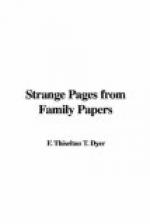Upon this the mother, falling upon her knees, cursed the Earl, and prayed that God’s mischief might fall upon him in the first battle in which he was engaged. Curious to relate, on the eve of the battle of Edgcot Field, having marshalled his men in order to fight, the Earl of Pembroke was surprised to find his brother, Sir Richard Herbert, standing in the front of his company, and leaning upon his pole-axe in a most dejected and pensive mood.
“What,” cried the Earl, “doth thy great body” (for Sir Richard was taller than anyone in the army) “apprehend anything, that thou art so melancholy? or art thou weary with marching, that thou dost lean thus upon thy pole-axe?”
“I am not weary with marching,” replied Sir Richard, “nor do I apprehend anything for myself; but I cannot but apprehend on your part lest the curse of the woman fall upon you.”
And the curse of the frantic mother of seven convicts seemed, we are told, to have gained the authority of Heaven, for both the Earl and his brother Sir Richard, were defeated at the battle of Edgcot, were both taken prisoners and put to death.
Sir Walter Scott has made a similar legend the subject of one of his ballads in the “Minstrelsy of the Scottish Border,” entitled “The Curse of Moy,” a tale founded on an ancient Highland tradition that originated in a feud between the clans of Chattan and Grant. The Castle of Moy, the early residence of Mackintosh, the chief of the clan Chattan, is situated among the mountains of Inverness-shire, and stands on the edge of a small gloomy lake called Loch Moy, in which is still shown a rocky island as the spot where the dungeon stood in which prisoners were confined by the former chiefs of Moy. On a certain evening, in the annals of Moy, the scene is represented as having been one of extreme merriment, for
In childbed lay the lady fair,
But now is come the appointed
hour.
And vassals shout, “An
heir, an heir!”
It is no ordinary occasion, for a wretched curse has long hung over the Castle of Moy, but at last the spell seems broken, and, as the well-spiced bowl goes round, shout after shout echoes and re-echoes through the castle, “An heir, an heir!” Many a year had passed without the prospect of such an event, and it had looked as if the ill-omened words uttered in the past were to be realised. It was no wonder then that “in the gloomy towers of Moy” there were feasting and revelry, for a child is born who is to perpetuate the clan which hitherto had seemed threatened with extinction. But, even on this festive night when every heart is tuned for song and mirth, there suddenly appears a mysterious figure, a pale and shivering form, by “age and frenzy haggard made,” who defiantly exclaims “’Tis vain! ’Tis vain!”
At once all eyes are turned on this strange form, as she, in mocking gesture, casts a look of withering scorn on the scene around her, and startles the jovial vassals with the reproachful words “No heir! No heir!” The laughter is hushed, the pipes no longer sound, for the witch with uplifted hand beckons that she had a message to tell—a message from Death—she might truly say, “What means these bowls of wine—these festive songs?”




